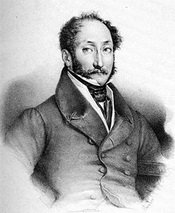(1788-1865)
Born in Genoa, Felice Romani studied law, as well as literature, both in his native city and in Pisa. In the course of his studies, he primarily translated French literature, in addition contributing to the development of a dictionary of mythology. Later on, several of his librettos would deal with either French literature or mythological subjects. After his studies, he toured Europe, visiting France, Spain, Greece and Germany. Around 1812, he returned to Milan, where he settled and met various figures from the worlds of literature and music. After turning down a position as court poet in Vienna and writing two successful librettos, he contracted with La Scala and became one of the most sought-after librettists of his time, writing texts for many famous composers, including Bellini (Norma, I Capuleti e i Montecchi), Donizetti (L'elisir d'amore, Lucrezia Borgia), Rossini (Il turco in Italia), Mercadante and Meyerbeer (Margherita d'Anjou).
Between 1834 and 1849, with brief interruptions, he was employed by the Savoy court in Turin as editor and writer for the ministerial newspaper Gazzetta ufficiale piemontese. During this period, he wrote fewer opera librettos than before, although he did produce numerous pieces of literary criticism.
In keeping with the customs of the time, Romani only rarely worked together with the composers for whom he wrote librettos. Exceptions to this were Meyerbeer and Bellini, who worked closely with Romani in developing plot and structure. It was his collaboration with Bellini in particular that became a model for later opera composers and librettists.
Romani wrote around 90 librettos for 34 different composers. His own poems were published in 1841, and he also remained active as a translator, translating French literature to his own native Italian.
Born in Genoa, Felice Romani studied law, as well as literature, both in his native city and in Pisa. In the course of his studies, he primarily translated French literature, in addition contributing to the development of a dictionary of mythology. Later on, several of his librettos would deal with either French literature or mythological subjects. After his studies, he toured Europe, visiting France, Spain, Greece and Germany. Around 1812, he returned to Milan, where he settled and met various figures from the worlds of literature and music. After turning down a position as court poet in Vienna and writing two successful librettos, he contracted with La Scala and became one of the most sought-after librettists of his time, writing texts for many famous composers, including Bellini (Norma, I Capuleti e i Montecchi), Donizetti (L'elisir d'amore, Lucrezia Borgia), Rossini (Il turco in Italia), Mercadante and Meyerbeer (Margherita d'Anjou).
Between 1834 and 1849, with brief interruptions, he was employed by the Savoy court in Turin as editor and writer for the ministerial newspaper Gazzetta ufficiale piemontese. During this period, he wrote fewer opera librettos than before, although he did produce numerous pieces of literary criticism.
In keeping with the customs of the time, Romani only rarely worked together with the composers for whom he wrote librettos. Exceptions to this were Meyerbeer and Bellini, who worked closely with Romani in developing plot and structure. It was his collaboration with Bellini in particular that became a model for later opera composers and librettists.
Romani wrote around 90 librettos for 34 different composers. His own poems were published in 1841, and he also remained active as a translator, translating French literature to his own native Italian.
